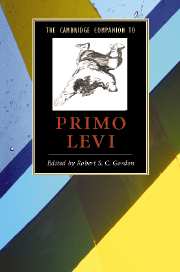7 - Primo Levi’s science-fiction
from Part III: - Science
Published online by Cambridge University Press: 28 November 2007
Summary
Levi's 'science-fiction' or 'science-fantasy' stories make for fascinating and often unsettling reading. They are stories that slip in and out of conventional genre categories, oscillating between narrating what appears to be purely fictional, and what feels uncannily close to our lived experience. Levi moves from myth and fable to satire and irony; at times he focuses on alternative histories, at others on dystopic futures, in a way that recalls resonantly the range of the science-fiction writer Arthur C. Clarke. Subjects tackled include: robots that compose poetry; duplicator machines; virtual reality devices; cryogenics; test-tube babies; and a sinister, self-generating telephone network. Most of Levi's stories that fall into this rather blurry category are collected in two volumes: Storie naturali ('Natural Histories', 1966), and Vizio di forma ('Formal Defect', 1971).
Levi first began writing stories of this kind relatively early on in his writing career; the first drafts of 'The Mnemogogues' ('I mnemagoghi'), 'The Sixth Day' ('Il sesto giorno') and 'The Sleeping Beauty in the Fridge: A Winter's Tale' ('La bella addormentata nel frigo') (all from 'Natural Histories', all in The Sixth Day), date from 1946, 1946-7 and 1952 respectively. Many stories first appeared in newspapers such as Il mondo and Il giorno and were reworked for republication in the later collections. They thus run contemporaneous with his testimonial work, and, as will be seen below, act as extensions of Levi's writing about the Lager. This chapter, as well as exploring such links, examines the ways in which Levi uses fiction as a vehicle to comment on and think through contemporary and future scientific developments. In this sense the stories are themselves forms of experimental writing. In particular, it looks at his problematization of scientific 'progress' as inevitably beneficial for human life, and explores themoral and ethical concerns that he feels are raised by such developments.
- Type
- Chapter
- Information
- The Cambridge Companion to Primo Levi , pp. 105 - 118Publisher: Cambridge University PressPrint publication year: 2007
- 3
- Cited by

